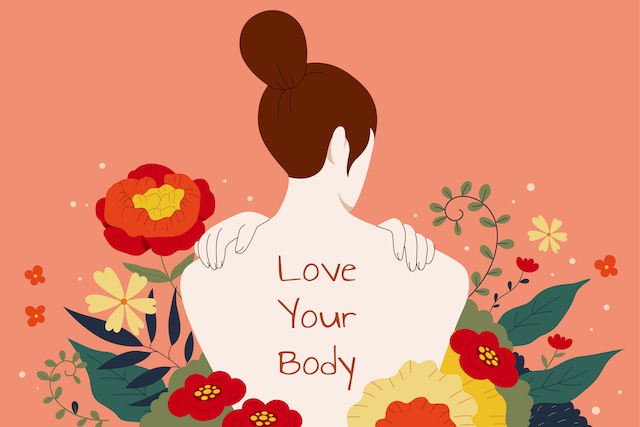
“When we listen to our body with kindness, we honor the present moment and give ourselves the care we truly need.” ~Thich Nhat Hanh
It started back in middle school for me—the need to feel thin in my English riding breeches. I’d compare myself to others at the barn—the ones with the long, slender legs and tiny waists. My thirteen-year-old self wasn’t willing to be chubby; though, looking back, I realize that was only in my own eyes.
What I didn’t know then was that by ignoring my hunger, my cravings, and my body’s messages, I was also silencing my own voice. It would take decades before I learned that listening to my body was not just about food—it was an act of love.
At first, I learned to override my body’s cues—hunger, cravings, thirst, even sadness.
Slowly, over time, I tuned out every signal my body sent me.
When I look back now, I see that I was restricting “just enough” to fly under the radar, but honestly, I’m not sure my parents would have noticed. Not noticing was the theme of my adolescence.
In college, I was a vegetarian and an athlete. Rowing seemed like the logical next step from horseback riding. I loved being on the water, and I loved the challenge. And I needed to be distracted. What better way to avoid myself than a full course load, twice-a-day practices, and a part-time job?
I asked a lot of my body during this time, while still locked in full-blown disordered eating. I ran on quick-burning, simple carbohydrates—donuts, Pop-Tarts, and a whole lot of Swedish Fish. And on weekends? Alcohol and pot took over. I numbed, I ran, I ignored.
When I moved to Montana at age twenty, I packed up my disordered eating and body dysmorphia and took them with me. Rowing had made me bulky, with big lats, huge arms, and solid thighs. So, in the only way I knew, I restricted fully—until I felt light in my body again. Not too thin, just enough to stay unnoticed.
Settled in Montana, I ate one meal a day—if you could call it that. Honey on white toast, a latte with two pumps of vanilla. I was walking around in a fog, going to class, working, partying, drifting without direction or self-awareness. When I look back on that time, I want to hug the girl I was. My body, my heart—they were doing everything they could to keep me going.
I wish I could say there was a single, defining moment that changed everything. But healing wasn’t a sudden revelation—it was a slow unfolding, like the first light of dawn after a long night. A gradual awakening to myself, one small act of listening at a time.
The shift began, almost unknowingly, when I joined the local food co-op. Fresh food was abundant, and unwittingly, I found role models in the shoppers around me. They looked vibrant, grounded. Healthy. I wanted that.
I began noticing things. My usual cow milk latte left my heart racing, my stomach bloated, rashes appearing on my arms. So I experimented. I learned to cook. I added in different foods. I started eating meat again.
One day, I realized that the fog in my brain had lifted—just slightly. And I wanted more of that. I was craving something new—something I had never craved before. Health. Clarity.
For the first time, I didn’t see cravings as something to fight but as information.
My sugar cravings weren’t a moral failing; they were my body begging for nourishment after years of restriction.
My exhaustion wasn’t something to push through; it was a plea for rest.
When I approached my body with curiosity instead of judgment, I finally started to hear what it had been trying to tell me all along.
And so, I went along. I met a lovely man who lit me up, and we married. Years later, we had a son, the apple of my eye.
Being in a relationship, caring for another human—it was tricky at first. I was still a fledgling cue reader, still learning how to listen to my own needs while meeting the needs of others.
Before I met my husband, I had slowly begun healing from childhood wounds. It was a bumpy road, full of missteps, but I kept at it. I practiced tuning in, listening with curiosity. Noticing when judgment arose—because judgment had always been my first language—and replacing it with compassion. Asking my body what it needed and, for once, responding with care.
I began caring for myself as I would care for my child—with tenderness, patience, and deep love. I swapped sugar for whole, nourishing foods, not out of punishment but because my body wanted them. I stopped running myself ragged and, instead, allowed myself to rest.
Now, at fifty, my son has flown the nest, and my husband and I are celebrating twenty-four years together. My old friends—disordered eating and body image struggles—still visit sometimes, especially as I navigate menopause. But now, I meet them differently.
I don’t fight them, and I don’t let them take over. I simply ask, What are you here to tell me?
Because now I know: Listening to my body isn’t about control or discipline. It’s about love.
And in that listening, I find my way home to myself, again and again.

